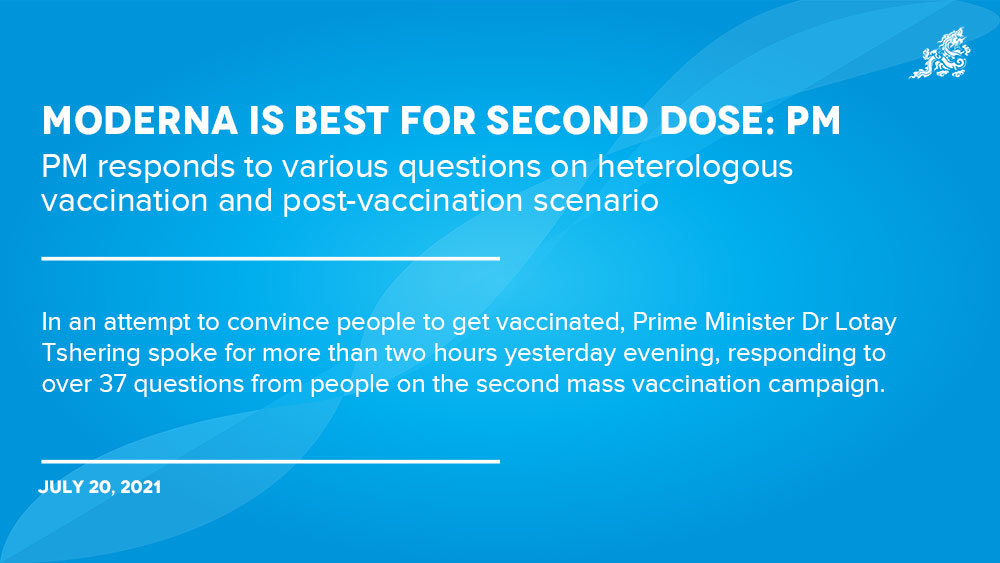PM responds to various questions on heterologous vaccination and post-vaccination scenario
Younten Tshedup
In an attempt to convince people to get vaccinated, Prime Minister Dr Lotay Tshering spoke for more than two hours yesterday evening, responding to over 37 questions from people on the second mass vaccination campaign.
As a medical professional, he said that the reason why he opted for the Moderna vaccine as his second dose after receiving AstraZeneca during the first was because of the efficacy of the mix-and-match regime.
Lyonchhen explained that of the many heterologous (mix-and-match) approaches to Covid-19 vaccination, the regime that was recommended in Bhutan was backed by scientific evidence and research.
He said that what the government and experts in the country were recommending was mixing the Moderna vaccine as the second dose to AstraZeneca (first dose). This regime, he said, has proven to be more efficacious especially against the emerging variants of SARS-CoV-2 virus including the Delta variant, which is the dominant variant in the country today.
“This is the reason why I took Moderna as my second dose to my first dose of AstraZeneca,” Lyonchhen said. “I’d like to have the maximum protection by using a safe vaccine.”
He said that he didn’t mix the vaccine as a politician to show off or for any other reason. “I wouldn’t risk my life for that. As a professional and a medical practitioner, I cannot bring politics ahead of the efficacy of a vaccine.”
He added that mixing AstraZeneca and Sinopharm vaccines was also a heterologous approach but that regime of mix-and-match was not studied and backed by evidence.
Lyonchhen added that now with the availability of different types of vaccines in the country, the government was giving people a choice. “However, if you are in doubt, take Moderna as the second dose to AstraZeneca as the efficacy is much higher.”
Many countries, where two doses of Sinopharm or AstraZeneca vaccines were administered, Lyonchhen said, were now looking for a third dose of a mRNA vaccine (Pfizer or Moderna).
Eligibility
All adults, above 18 years, in the country are eligible to receive the Covid-19 vaccines, Lyonchhen said. This includes pregnant or lactating mothers, people with comorbidities, those in high-risk areas or under lockdown, alcohol dependent or those in quarantine facilities.
Lyonchhen said that medically there were no counter-indications that Covid-19 vaccines were unsafe for pregnant or lactating mothers. “During our first dose, pregnant women and breastfeeding mothers were not given the vaccine as they were not included in the test conducted to study the efficacy of the vaccine.”
Almost seven months after the Covid-19 vaccines were first used, the Prime Minister said that there were no reports of any complications induced by vaccines in pregnant and lactating mothers.
Lyonchhen also urged elderlies with comorbidities to come forward and get vaccinated.
“We recently lost an 83-year-old woman in Phuentsholing. Besides her multiple medical conditions, the woman was unvaccinated,” he said, adding that upon investigation it was learnt that the family of the deceased felt that the woman should not get vaccinated given her medical condition and her minimal interactions outside.
“If she was vaccinated, she would be with us today because vaccination reduces mortality by almost 90 percent,” he said.
Except for those currently infected with the virus, people with anaphylaxis or severe reaction to vaccine, and those with flu-like symptoms, the rest would be eligible to receive their Covid-19 vaccine, Lyonchhen said.
For the active patients and those with flu-like symptoms the vaccination date would be deferred. They, however, would receive their dose at a later date.
People currently in the quarantine would also be given the vaccines upon the completion of the quarantine period.
With many questioning if the second dose would be still effective after a long gap from the first dose, Lyonchhen explained that a delay in receiving the vaccines on the dot was not a worry in terms of developing antibodies for future protection. “The only risk here is that people would be exposed to infection during this window.”
Relaxations
Besides doubts on the heterologous regime, one of the biggest concerns during the two-hour Live Facebook conversation last night was on post-vaccination relaxations.
Lyonchhen assured that a certain level of relaxation would be made in the existing protocols. However, he said that the relaxations would be contingent upon the vaccine coverage and herd immunity, which the government was targeting for from the mass campaign.
“If we can achieve the required herd immunity of 80 plus percent coverage, relaxations would definitely come,” he said. “By the end of the month, we have an opportunity to become one of the first counties in the world to achieve herd immunity against Covid-19.”
Edited by Tshering Palden


